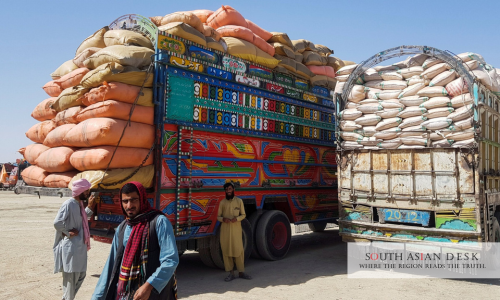Afghanistan Pakistan trade declines to $1.108 billion in the first half of 2025, down $9 million from $1.117 billion in the same period last year, officials said on Monday. The drop stems from Pak Afghan transit trade barriers, Torkham border trade disruptions, and bilateral trade security issues, per the Afghan Ministry of Industry and Commerce.
This slump highlights vulnerabilities in South Asia’s economic web. Afghanistan relies on Pakistan for over 80 per cent of its transit routes to sea ports, while Pakistan exports essentials like rice and cement worth hundreds of millions annually. Disruptions ripple outward, hiking costs for Afghan importers and straining Pakistani exporters amid regional inflation pressures. Stable Afghanistan Pakistan trade declines prevention could bolster food security across borders and foster growth in landlocked economies, experts note. Yet persistent frictions risk isolating both nations in a competitive neighbourhood.
Persistent Pak Afghan Transit Trade Barriers Hamper Flows
Pak Afghan transit trade barriers have intensified since early 2025, choking the Afghanistan Pakistan trade pipeline. Customs tariffs on Afghan coal and lentils, key exports totalling $277 million to Pakistan in H1, rose by up to 20 per cent, Afghan officials report. These levies, aimed at curbing smuggling, instead diverted shipments to costlier Iranian routes, adding PKR 500 million in logistics expenses for traders.
The Afghan Ministry of Industry and Commerce flagged these hurdles in recent data. “Challenges in trade exchanges, including customs tariffs and transit issues, have contributed to the decrease,” spokesperson Akhundzada Abdul Salam Jawad stated. Pakistan’s side mirrors the strain: imports from Afghanistan fell to $277 million against $712 million in exports, per Ministry of Commerce figures, yielding a $435 million deficit.
World Bank analysis in April pinpointed these barriers as drivers of route shifts. Afghanistan rerouted 15 per cent of goods via Central Asia, citing higher Pakistani tariffs on select items. Transit delays averaged 48 hours at checkpoints, up from 24, inflating per-truck costs by 30 per cent.
Traders report stark impacts. Afghan mung bean shipments, a staple export, faced PKR 200 million in extra duties. Pakistan’s cement exports—vital for Afghan reconstruction—dipped 12 per cent year-on-year. These Pak Afghan transit trade barriers not only fuel Afghanistan Pakistan trade declines but also erode trust in the 2010 Afghanistan-Pakistan Transit Trade Agreement.
Torkham Border Trade Disruptions Fuel Economic Strain
Torkham border trade disruptions dominated H1 headlines, exacerbating Afghanistan Pakistan trade declines. The vital crossing, handling 40 per cent of bilateral volume, shut for 27 days from February 21 after a fence dispute escalated into clashes. Pakistani forces cited unauthorised Afghan construction; Afghan officials decried it as sovereignty infringement.
Reopening on March 19 followed a ceasefire pact, yet sporadic halts persisted. A one-day internet blackout in August idled scanners, stranding 500 trucks and costing $2 million in spoiled perishables like cucumbers and potatoes. Cumulative losses topped PKR 1 billion, per chamber estimates.
These Torkham border trade disruptions compound Pak Afghan transit trade barriers. Truck queues stretched five kilometres, delaying rice imports critical for Afghan markets. Exports of talc stone and tobacco, $50 million combined, rotted in lots. August saw a rebound to $143 million total trade, up 4 per cent from July, as eased checks kicked in. Still, volumes lag pre-disruption peaks.
Bilateral Trade Security Issues Spark Clashes
Bilateral trade security issues underpin many Torkham woes. Cross-border fire on March 3 killed one and wounded five, halting flows for days. Pakistani troops fired mortars after Afghan guards advanced; both sides blamed militants.
Pakistan’s Ministry of Commerce echoed calls for separation. In July talks, officials pledged joint patrols to safeguard convoys. Yet bilateral trade security issues persist, with smuggling probes seizing $10 million in illicit goods at Torkham.
These frictions amplify Pak Afghan transit trade barriers, deterring investors. Afghan Chamber CEO Wasim Safi warned: “Efforts must be made to establish good trade relations so we can benefit from this situation.” Analyst Mohammad Karim Azimi added: “We can increase Afghanistan’s trade volume through Pakistan by using the ports of Karachi and Gwadar, which would benefit both countries.”
Official Pacts Aim to Counter Decline
Mid-year shifts offered glimmers. On July 23, ministries signed a Preferential Trade Agreement slashing tariffs on 50 items, effective August 1. The one-year pact, renewable, targets $200 million in added volume by exempting duties on beans and medical supplies.
Afghan embassy in Islamabad hailed it: “This agreement will boost trade, improve transit facilities.” Pakistan’s side committed to streamlined visas for drivers, addressing Torkham bottlenecks.
Transit trade surged 9 per cent in July-August, hitting $107 million in Afghan outflows via Pakistan. Yet experts caution: without resolving bilateral trade security issues, gains may evaporate.
Background of Afghanistan Pakistan Trade Decline
The Afghanistan-Pakistan corridor traces to ancient Silk Road paths, modernised by the 2010 transit pact. Volumes peaked at $2.5 billion in 2019 but dipped amid political shifts. H1 2025’s Afghanistan Pakistan trade declines mark the sharpest since 2022, blending old grievances with new tariffs.
What’s Next
Upcoming J2 talks in October target Torkham upgrades and security protocols. If successful, analysts predict a 10 per cent rebound by year-end, staving off further Afghanistan Pakistan trade declines. Failure could push Afghanistan deeper into Iranian dependence, reshaping South Asian dynamics.
Afghanistan Pakistan trade declines underscore the need for sustained dialogue amid Pak Afghan transit trade barriers, Torkham border trade disruptions, and bilateral trade security issues.
Published in SouthAsianDesk, September 29th, 2025
Follow SouthAsianDesk on X, Instagram, and Facebook for insights on business and current affairs from across South Asia.






